Papers by Lacey J Davidson
A Companion to Public Philosophy, 2022
Philosophical Psychology, 2017

Social Trust, 2021
A community demonstrates social trust when most members believe that others in their community ar... more A community demonstrates social trust when most members believe that others in their community are contributing to the goals and projects of one another by complying with mutually beneficial shared social norms. Scholars have argued that social trust is a good thing because it plays an essential stabilizing role in cooperative systems and provides many important benefits. Much of the relevant literature on social trust has assumed that individuals are epistemically justified in believing that others will comply with mutually beneficial norms. This paper examines circumstances when such epistemic justification is not present. Focusing on the example of anti-Black racism in the United States, we offer an account of epistemically justified social distrust in which individuals are justified in believing that others in their community are irrelevant or harmful for achieving one another’s goals either by upholding harmful social norms or by failing to uphold beneficial social norms in an inclusive manner. We also explore potential pathways for building trust when social distrust is epistemically justified. Because justified social trust requires evidence that society is in fact trustworthy, the first step to building justified social trust must be building a society that is in fact trustworthy.
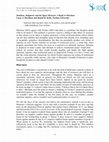
Sherman (2015) agrees with Fricker (2007) that there is a problem, but disagrees about what to do... more Sherman (2015) agrees with Fricker (2007) that there is a problem, but disagrees about what to do about it. The problem is epistemic injustice, failing to take others as seriously as they deserve to be taken in matters epistemic, a form of miscalculation whose effects can not only stabilize and strengthen types of injustice that already exist, including types of inequality, prejudice, discrimination, but that can potentially produce new forms of injustice as well. Fricker sketches an account of testimonial justice, a virtue that, when properly nourished, she claims can serve as a corrective to epistemic injustice. Sherman is skeptical on many counts: that attempts to achieve testimonial justice would help — indeed, he worries that they would actually backfire and hinder the fight against epistemic injustice; that testimonial justice as depicted by Fricker is in fact a virtue; and that the virtue-theoretic framework via which Fricker expresses her notion of testimonial justice is gen...
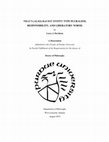
Some philosophers (Blum 2002 and Anderson 2010) have argued that ‘racism’ and ‘racist’ have been ... more Some philosophers (Blum 2002 and Anderson 2010) have argued that ‘racism’ and ‘racist’ have been used so widely that they have lost their conceptual potency and are no longer effective moral evaluations. For this reason, they think we should use other terms to identify racial injustices. It is the goal of this dissertation to argue against this conclusion. In Chapter 2, I develop tools for diagnosing the individualist versus structuralist debate within philosophical accounts of racism. I use these tools to show that both individualists and structuralists are committed to entity type monism or the view that only certain kinds of entities can be racist. I reject this view and argue for entity type pluralism. In Chapter 3, I move from entity type pluralism to develop an account of the application conditions for the predicate ‘racist’ that tell us when and why we should apply the predicate to particular entities. These two chapters serve to clarify RACISM. In Chapter 4, I develop new re...

In this paper I reject the claim – made both by Tamar Szabo Gendler in On the Epistemic Costs of ... more In this paper I reject the claim – made both by Tamar Szabo Gendler in On the Epistemic Costs of Implicit Bias and Jennifer Saul in Scepticism and Implicit Bias – that in order to be epistemically and morally responsible, social categories should not influence our evaluations of individuals or subsequent actions. I will provide evidence against the claim by denying its empirical plausibility, emphasizing the epistemic and moral benefits that may come from social categories, and reconceptualizing the inclusion of base-rate information. Throughout the paper I will emphasize the unique interlocking of epistemic and moral considerations that are relevant to implicit bias, bias mitigation, and responsibility. It is my hope that this analysis lays the groundwork for an account of the right ways social categories can affect our judgments, i.e. the ways in which such influence may improve our epistemic and moral situations rather than degrade them.
An Introduction to Implicit Bias, 2020
The Philosophical Quarterly, 2020
Journal of Applied Philosophy, 2018
We argue that work on norms provides a way to move beyond debates between proponents of individua... more We argue that work on norms provides a way to move beyond debates between proponents of individualist and structuralist approaches to bias, oppression, and injustice. We briefly map out the geography of that debate before presenting Charlotte Witt's view, showing how her position, and the normative ascriptivism at its heart, seamlessly connects individuals to the social reality they inhabit. We then describe recent empirical work on the psychology of norms and locate the notions of informal institutions and soft structures with respect to it. Finally, we argue that the empirical resources enrich Witt's ascriptivism, and that the resulting picture shows theorists need not, indeed should not, choose between either the individualist or structuralist camp.
The Routledge Handbook of Philosophy, Politics, and Economics, 2022
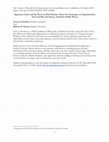
Fat Studies, 2019
In this paper we utilize standpoint theory to analyze our lived experiences as fat womxn and orga... more In this paper we utilize standpoint theory to analyze our lived experiences as fat womxn and organizers and use our experiences as fat womxn to contribute to our understandings of standpoint theory and epistemic labor. We argue that fat womxn have an epistemic advantage with respect to what it is like to live in the world as fat womxn and that this advantage can be used against us in ways that contribute to and maintain our oppression. We identify and develop five patterns of epistemic labor that work together to shape fat womxn’s experiences, especially as it relates to how we are treated as knowers or non-knowers and the labor that is demanded of us in our interpersonal relationships, in public, and in an organizing context. We use an analysis of our lived experiences, as well as resources from standpoint theory, to identify three fat archetypes. The archetypes track specific patterns of labor that dominantly situated people enforce in their interactions with fat womxn through their communicative behaviors and epistemic practices. It is our hope that the identification of these archetypes and patterns of epistemic labor, which render visible the often invisible forms of oppression that show up in interpersonal interactions, are helpful tools for unlearning fatphobic ways of being and interacting. We end by emphasizing that the fat liberation struggle is tied up with the liberation struggles of all oppressed peoples and that this understanding is needed in order to take action together for sustainable change.
Journal of Applied Philosophy, 2019
We argue that work on norms provides a way to move beyond debates between proponents of individua... more We argue that work on norms provides a way to move beyond debates between proponents of individualist and structuralist approaches to bias, oppression, and injustice. We briefly map out the geography of that debate before presenting Charlotte Witt's view, showing how her position, and the normative ascriptivism at its heart, seamlessly connects individuals to the social reality they inhabit. We then describe recent empirical work on the psychology of norms and locate the notions of informal institutions and soft structures with respect to it. Finally, we argue that the empirical resources enrich Witt's ascriptivism, and that the resulting picture shows theorists need not, indeed should not, choose between either the individualist or structuralist camp.
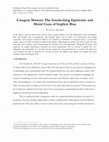
In this paper I reject the claim—made both by Tamar Szabo Gendler in On the Epistemic Costs of Im... more In this paper I reject the claim—made both by Tamar Szabo Gendler in On the Epistemic Costs of Implicit Bias and Jennifer Saul in Scepticism and Implicit Bias—that in order to be epistemically and morally responsible, social categories should not influence our evaluations of individuals or subsequent actions. I will provide evidence against the claim by denying its empirical plausibility, emphasizing the epistemic and moral benefits that may come from social categories, and reconceptualizing the inclusion of base-rate information. Throughout the paper I will emphasize the unique interlocking of epistemic and moral considerations that are relevant to implicit bias, bias mitigation, and responsibility. It is my hope that this analysis lays the groundwork for an account of the right ways social categories can affect our judgments, i.e. the ways in which such influence may improve our epistemic and moral situations rather than degrade them.

In this paper, we apply the work of feminist and critical race epistemology to epistemic issues r... more In this paper, we apply the work of feminist and critical race epistemology to epistemic issues related to HIV and HIV transmission risk. We identify ways in which popular social perceptions about HIV do not properly align with empirical findings, and we develop a framework for explaining this incongruency. Central to our discussion is the identification of epistemic harms related to HIV and some of the normative implications of the presence of these harms. After providing the necessary sociological and medical background information about HIV in the United States, we identify two types of previously identified epistemic harms—hermeneutical injustice and contributory injustice—in the context of issues related to HIV and being HIV-positive. We then identify a novel type of epistemic harm, structural-linguistic epistemic injustice, and apply it to epistemic issues pertinent to HIV and HIV transmission risk.
Drafts by Lacey J Davidson
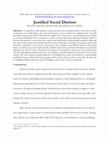
Social Trust, 2021
A community demonstrates social trust when most members believe that others in their community ar... more A community demonstrates social trust when most members believe that others in their community are contributing to the goals and projects of one another by complying with mutually beneficial shared social norms. Scholars have argued that social trust is a good thing because it plays an essential stabilizing role in cooperative systems and provides many important benefits. Much of the relevant literature on social trust has assumed that individuals are epistemically justified in believing that others will comply with mutually beneficial norms. This paper examines circumstances when such epistemic justification is not present. Focusing on the example of anti-Black racism in the United States, we offer an account of epistemically justified social distrust in which individuals are justified in believing that others in their community are irrelevant or harmful for achieving one another’s goals either by upholding harmful social norms or by failing to uphold beneficial social norms in an inclusive manner. We also explore potential pathways for building trust when social distrust is epistemically justified. Because justified social trust requires evidence that society is in fact trustworthy, the first step to building justified social trust must be building a society that is in fact trustworthy.









Uploads
Papers by Lacey J Davidson
Drafts by Lacey J Davidson